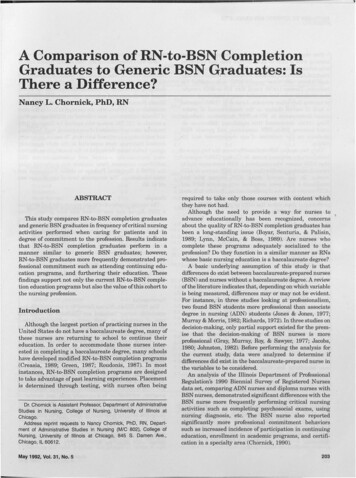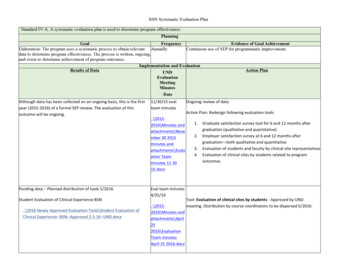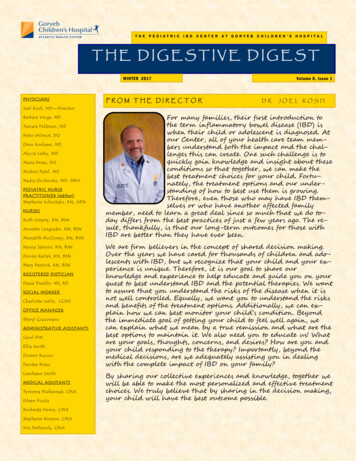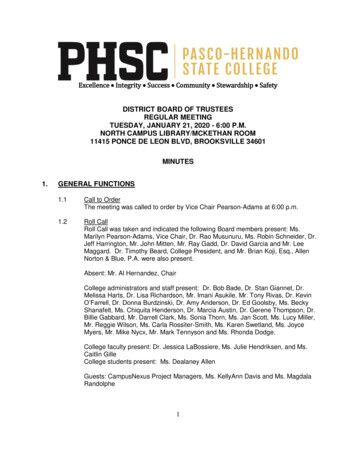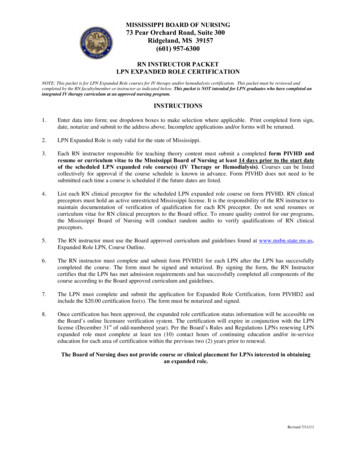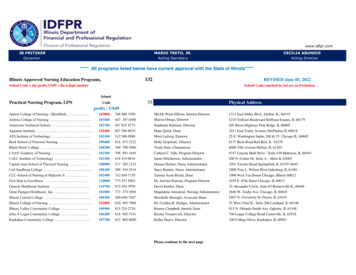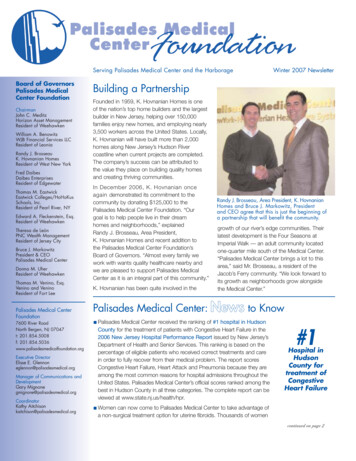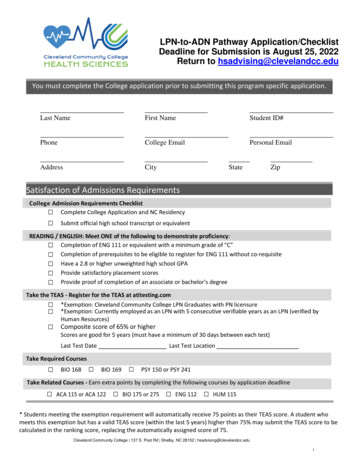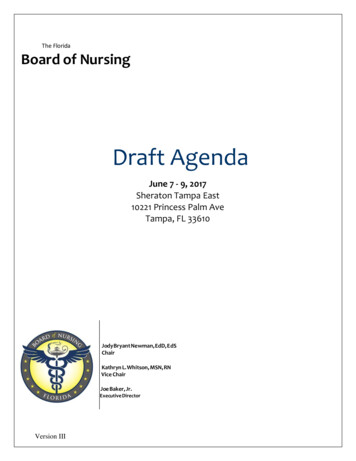
Transcription
LPN-BSN PROGRAMLPN-BSN ProgramLicensed Practical Nurse (LPN) students have the opportunityto challenge five specific courses in Nursing by successfullycompleting examinations from National League for Nursing(NLN) Mobility Examinations. The NLN Mobility Examinationsinclude: Principles of Nursing, Nutrition, Obstetrics, Pediatrics,and Psychiatric/Mental Health. These examinations are usedto facilitate the LPN to RN transition.For details and enrollment information, contactthe Coordinator of the LPN/BSN program.License to PracticeCandidates for a license to practice in the health field arerequired to have "good moral character." The PennsylvaniaState Board of Nursing takes into consideration, whendeciding on the applications for registration and a license topractice under their jurisdiction, whether candidates havebeen convicted of any felony or misdemeanor. Candidates arereferred to the regulations specified in the Professional NurseLaw (P.L. 317, No. 69).BIO. BIOLOGYBIO-105. THE BIOLOGICAL WORLDCredits: 3This course presents concepts and modern ideas pertainingto the natural world and the life sciences. Each semester,a selected topic will be addressed and explored from aninvestigative set of perspectives. While the scientific methodwill be emphasized in each offering, the range of topics,identified as a subtitle in the course offering data, willinclude, for example, 1) Genetics, Evolution, and Ecology:Implications for a Changing Society, 2) Human Biology, 3)Contemporary Issues in the Life Sciences, and others. Thiscourse is intended for students who are not majoring inscience, engineering, pre-pharmacy, and nursing, or pursuingB.S. programs in mathematics or computer science. Fallsemesters: Human Biology—two hours of lecture and twohours of laboratory per week. Dissections of specimens maybe required in the laboratory component. Spring semesters:Contemporary Issues in the Life Sciences—three hours oflecture each week.Click here for course fee.BIO-113. MICROBIOLOGYCredits: 4This course presents the basic principles of bacteriologyand the relationship of micro-organisms to disease and itsprevention, control, and treatment. It considers the effects ofmicrobes within the body and the body’s reaction to them.Lecture, three hours per week; laboratory, three hours perweek. Offered every spring semester.Click here for course fee.BIO-115. ANATOMY & PHYSIOLOGY ICredits: 4Terms Offered: FallThis course provides a general study of the human body, itsstructure and normal function. It providesan appreciation of the complex nature of the human body withrelation to the promotion of a healthy organism. Dissectionsof specimens are required in the laboratory portion of thesecourses. Lecture, three hours per week; laboratory, threehours per week.Click here for course fee.BIO-116. ANATOMY & PHYSIOLOGY IICredits: 4Terms Offered: SpringThis course is a continuation of [[BIO-115]] and provides ageneral study of the human body, its structure and normalfunction. It provides an appreciation of the complex nature ofthe human body with relation to the promotion of a healthyorganism. Dissections of specimens are required in thelaboratory portion of these courses. Lecture, three hours perweek; laboratory, three hours per week.Click here for course fee.Pre-Requisites[[BIO-115]] or permission of instructor.BIO-121. PRINCIPLES OF MODERN BIOLOGY ICredits: 4Terms Offered: FallAn introduction to concepts of modern biology for studentsmajoring in biology and other sciences. Topics covered includethe origin of life, basic biochemistry, cell structure and function,energetics, reproduction and heredity, molecular genetics, andevolution. Four hours of lecture and three hours of laboratoryper week. Offered every fall semester. Required of all Biologymajors.Click here for course fee.Co-Requisites[[CHM-115]]BIO-122. PRINCIPLES OF MODERN BIOLOGY IICredits: 4Terms Offered: SpringAn introduction to biological diversity and mammalianstructure and function for science majors, usually taken asa continuation of [[BIO-121]]. Topics include organismalclassification, a survey of biological diversity (includingcharacteristics, ecology, phylogenetic relationships, andeconomic and biomedical uses) of microbes, plants, andanimals, and an overview of the mammalian body addressingthe form and function of key organ systems. Dissectionsof specimens are required in the laboratory portion of thiscourse. Four hours of lecture and three hours of laboratory perweek. Offered every spring semester. Required of all Biologymajors.Click here for course fee.Pre-Requisites[[BIO-115]] or permission of the instructor.1Wilkes University Undergraduate Bulletin 2022 - 2023
LPN-BSN ProgramBIO-198. TOPICSCredits: 1-3A study of topics of special interest not extensively treated inregularly offered courses.Click here for course fee.BIO-298. TOPICSCredits: 1-3A study of topics of special interest not extensively treated inregularly offered courses.Click here for course fee.Pre-RequisitesWill vary according to the specific topics course.Pre-RequisitesWill vary according to the specific topics course.BIO-225. POPULATION AND EVOLUTIONARY BIOLOGYCredits: 4Terms Offered: FallThis course emphasizes the patterns and processes ofevolutionary change in living systems in an ecologicalcontext. It reviews the basic characteristics and dynamicsof populations and the relevance of population ecology andpopulation genetics to the evolution of species. Humanevolutions, sociobiology, and other controversial issuesare also covered. Laboratory exercises emphasize anexperimental approach to more in-depth study of specifictopics covered in lecture. Four hours of lecture and threehours of laboratory per week. Offered every fall semester.Required of all Biology majors.Click here for course fee.BIO-306. INVERTEBRATE BIOLOGYCredits: 4This course is a study of the major invertebrate phyla withrespect to their taxonomy, evolution, morphology, physiology,and ecology. Three hours of lecture and three hours oflaboratory per week. Offered in alternate years.Click here for course fee.Pre-Requisites[[BIO-121]] and [[BIO-122]].BIO-226. CELLULAR AND MOLECULAR BIOLOGYCredits: 4Terms Offered: SpringFees:Cell structure in relation to function. Biochemistry andphysiology of animal, plant, and bacterial cells and theirviruses are presented in a molecular biology context. Celldivision and development are examined. Four hours of lectureand three hours of laboratory per week. Offered every springsemester. Required of all Biology majors.Click here for course fee.Pre-Requisites[[BIO-121]] and [[BIO-122]].BIO-254. SUPERLABCredits: 3Superlab is a research-oriented course in which students carryout laboratory and field-based investigations into researchareas such as ecotoxicology, plant physiology, ecology,phylogenetics, molecular biology, and cancer biology. In thiscourse, students have one hour of classroom instruction perweek during the regular semester followed by ten days (overa period of two weeks) of intensive laboratory work after theend of the semester. During that second phase of the course,students design and implement experiments and carry outresearch discussed during the first phase with the aid of theirinstructors. Offered each year.Pre-Requisites[[BIO-225]], [[BIO-226]] or [[BIO-226]] as co-requisite.2Pre-Requisites[[BIO-121]] - [[BIO-122]], [[BIO-225]] - [[BIO-226]], orpermission of the instructor.BIO-311. COMPARATIVE PHYSIOLOGYCredits: 4Comparative Physiology encompasses the study of organfunctions and organ system functions in different animalgroups. Emphasis is on the systemic physiology of vertebrateanimals. Three hours of lecture and three hours of laboratoryper week. Offered every spring semester. Offered in alternateyears.Click here for course fee.Pre-Requisites[[BIO-121]]- [[BIO-122]], [[BIO-225]]- [[BIO-226]], or permissionof the instructor.BIO-312. PARASITOLOGYCredits: 4Parasitology is the study of organisms that live on or withinother organisms and the relationship of these organisms totheir hosts. This course deals with the common parasites thatinfect humans and other animals. Three hours of lecture andthree hours of laboratory per week. Offered in alternate years.Click here for course fee.Pre-Requisites[[BIO-121]]- [[BIO-122]], [[BIO-225]]- [[BIO-226]], or permissionof the instructor.BIO-314. COMPARATIVE VERTEBRATE ANATOMYCredits: 4This course deals with the evolution and anatomy of the organsystems of vertebrates. Lectures survey the comparativeanatomy of the vertebrate classes. Laboratory dissectionsinclude the lamprey, shark, mud puppy, and cat in detail.Three hours of lecture and three hours of laboratory per week.Offered in alternate years.Click here for course fee.Pre-Requisites[[BIO-121]]- [[BIO-122]], [[BIO-225]].Wilkes University Undergraduate Bulletin 2022 - 2023
LPN-BSN ProgramBIO-321. MAMMALIAN PHYSIOLOGYCredits: 4This course examines the function of mammalian systemswith regard to homeostasis, metabolism, growth andreproduction. Normal physiological processes as well assome pathophysiological situations are covered. While theemphasis is on human physiology, other mammalian systemsare discussed to demonstrate physiological adaptabilityto various environmental situations. Laboratory exercisesinclude physiological experimentation in living systems and incomputer simulations. Three hours of lecture and three hoursof laboratory per week. Offered in alternate years. This coursesatisfies the requirement for a course with an emphasis inquantitative biology.Click here for course fee.Pre-Requisites[[BIO-121]]- [[BIO-122]], [[BIO-226]], or permission of theinstructor.BIO-323. FUNCTIONAL HISTOLOGYCredits: 4This course emphasizes the microscopic examination ofmammalian tissues from morphological and physiologicalperspectives. Reference is made to organ embryogenesisto support the understanding of organ form and function.Tissue preparation for histological examination is included.Three hours of lecture and three hours of laboratory per week.Offered in alternate years.Click here for course fee.Pre-Requisites[[BIO-121]]- [[BIO-122]], [[BIO-225]]- [[BIO-226]], or permissionof the instructor.BIO-324. MOLECULAR BIOLOGYCredits: 4Terms Offered: SpringThis course introduces students to modern concepts andtechniques in molecular biology through a genuine researchexperience in using cell and molecular biology to learn abouta fundamental problem in biology. Rather than following aset series of lectures, we study a problem and see where itleads us. We use the information given in lectures and readingassignments to solve research problems and, in the process,learn a lot of molecular biology. Offered every spring.Click here for course fee.Pre-Requisites[[BIO-225]]- [[BIO-226]], [[CHM-231]]- [[CHM-232]].BIO-325. ENDOCRINOLOGYCredits: 4This course focuses on the structure, biochemistry, andfunction of mammalian hormones and endocrine glands.Avian, amphibian, and invertebrate hormones are alsodiscussed, where relevant. Clinical pathologies resulting fromexcess or insufficient hormones are discussed, as this isessential to mastering an understanding of Endocrinology.Laboratory exercises include experimentation in living systemsand computer simulations. Three hours of lecture and threehours of laboratory per week. Offered in alternate years.Click here for course fee.Pre-Requisites[[BIO-121]]- [[BIO-122]], [[BIO-225]]- [[BIO-226]], or permissionof instructor.BIO-326. IMMUNOLOGY AND IMMUNOCHEMISTRYCredits: 4This course is concerned with the biological mechanismsand chemistry of reactants and mediators associated withnatural and acquired states of immunity, tissue and bloodserum responses to infection and immunization. Relatedpathophysiological alternations of hypersensitivity phenomenain vertebrate animals and man are also discussed. Threehours of lecture and three hours of laboratory per week.Offered in alternate years.Click here for course fee.Pre-Requisites[[BIO-121]]- [[BIO-122]], [[BIO-225]]- [[BIO-226]], or permissionof the instructor.BIO-327. MEDICAL MICROBIOLOGYCredits: 4Medical Microbiology provides a professional level introductionto microbiology that is focused on application of microbiologyto the study of infectious disease etiology and epidemiology.The laboratory covers techniques used in isolation andidentification of micro-organisms. Three hours of lectureand three hours of laboratory per week. Cross-listed with[[PHA-327]].Click here for course fee.Pre-Requisites[[BIO-121]]- [[BIO-122]], [[CHM-231]]- [[CHM-232]].BIO-328. DEVELOPMENTAL BIOLOGYCredits: 4A course dealing with the principles of animal developmentfrom descriptive, experimental, and evolutionary perspectives.Laboratory work includes both descriptive and experimentalembryology, including molecular techniques. Three hours oflecture and three hours of laboratory per week. Offered inalternate years.Click here for course fee.Pre-Requisites[[BIO-121]]- [[BIO-122]], [[BIO-225]]- [[BIO-226]], or permissionof the instructor.Wilkes University Undergraduate Bulletin 2022 - 20233
LPN-BSN ProgramBIO-329. VIROLOGYCredits: 3Virology provides an introduction to the biology of animalviruses. Description of viral molecular architecture andgenome organization is followed by a survey of strategiesemployed for multiplication and regulation of gene expression.Pathogenesis of viral infections is considered fromperspectives of viral reproduction strategies and host defense.Pre-Requisites[[BIO-121]]- [[BIO-122]], [[BIO-225]]- [[BIO-226]], [[CHM-231]][[CHM-232]], [[CHM-233]]- [[CHM-234]].BIO-330. INTRODUCTION TO BIOINFORMATICSAPPLICATIONSCredits: 3Terms Offered: FallAn introduction to the ways computers are used to makesense of biological information, especially the data generatedby the human genome project. Topics covered includedatabases and data mining, pair-wise, and multiple sequencealignment, molecular phylogeny, finding genes in raw DNAsequences, predicting protein and RNA secondary and tertiarystructures, generating and analyzing transcriptomic data,rational drug design, metabolic simulation and artificialintelligence. Offered online every fall, with one assignmenteach week. This course satisfies the requirement for a coursewith an emphasis in quantitative biology.Pre-Requisites[[BIO-225]]- [[BIO-226]], [[CHM-231]]- [[CHM-232]],[[MTH-150]], or permission of the instructor.BIO-338. BIOLOGY OF CANCERCredits: 3This lecture course is designed to explore the variousconcepts and mechanisms associated with the origins,elaborations, and future developments in cellulartransformation and carcinogenesis. Emphasis is placed onthe molecular biology and physiology of these processes;therefore, a solid background in basic biology is required.Oncogenes, tumor suppressor genes, and the disruptionof homeostasis are covered in detail, while the medicalphenomena typically receive a more general level ofcoverage.Pre-Requisites[[BIO-121]]- [[BIO-122]], [[BIO-226]], [[CHM-231]][[CHM-232]].BIO-340. CONSERVATION BIOLOGYCredits: 3This course covers the major topics of conservation biologyincluding an introduction to biodiversity, threats to biodiversity,and solutions to diminish extinctions and population declines.Lecture: three hours per week. Offered each year.Pre-Requisites[[BIO-225]]- [[BIO-226]] or permission of the instructor.BIO-341. FRESHWATER ECOSYSTEMSCredits: 3A study of the biological and ecological aspects of streams,lakes, and wetlands from a watershed perspective. An initialintroduction to physical, chemical, and geological principlesof limnology is followed by a focus on freshwater biology.Laboratories include field-based watershed investigations andlake management assessments using geographic informationsystems techniques. Two hours of lecture and three hours oflaboratory per week. Offered in alternate years. Cross-listedwith [[EES-341]].Click here for course fee.Pre-Requisites[[GEO-211]] or [[EES-240]] or [[BIO-121]]- [[BIO-122]] orconsent of the instructor.BIO-342. THE ARCHOSAURS: BIRDS, DINOSAURS, ANDCROCODILIANSCredits: 4An examination of the biology of the Archosaurs. Major topicsinclude evolutionary history, morphology, physiology, behavior,ecology, and conservation of archosaurs. Laboratory is largelyfield-based with an emphasis on identifying local fauna andpopulation estimation methods. Laboratory also includesdissection, histology, and a field trip to a museum. Offered inalternate years.Click here for course fee.Pre-Requisites[[BIO-225]] or permission of the instructor.BIO-343. MARINE ECOLOGYCredits: 3An examination of the biology of marine life within the contextof modern ecological principles. The structure and physiologyof marine organisms are studied from the perspectives ofadaptation to the ocean as habitat, biological productivity,and interspecific relationships. Emphasis is placed on life inintertidal zones, estuaries, surface waters, and the deep sea.Two hours of lecture and three hours of laboratory per week.Offered in alternate years. Cross-listed with [[EES-343]].Click here for course fee.Pre-Requisites[[EES-230]] and [[BIO-121]]- [[BIO-122]]. Students must haveformal course experiences in oceanography and biology at thescience major level or have completed their sophomore yearas a biology major.BIO-344. ECOLOGYCredits: 4An examination of contemporary ecological thinking as itpertains to the interrelationships of organisms and theirenvironments. Interactions at the population and communitylevel are emphasized. Three hours of lecture and three hoursof laboratory per week. Offered in alternate years. Cross-listedwith [[EES-344]]. This course satisfies the requirement for acourse with an emphasis in quantitative biology.Click here for course fee.Pre-Requisites[[BIO-121]]- [[BIO-122]] or permission of the instructor4Wilkes University Undergraduate Bulletin 2022 - 2023
LPN-BSN ProgramBIO-345. GENETICSCredits: 4This course presents a detailed treatment of genetics beyondthe introductory level in the areas of both transmission andmolecular genetics. It includes discussion of the role ofgenetics in such areas as developmental medicine. Threehours of lecture and three hours of lab per week. Offeredevery fall semester.Click here for course fee.BIO-352. PATHOPHYSIOLOGYCredits: 4Pathophysiology provides a series of lectures, exercises,and problem-solving sessions integrating the concepts offunctional anatomy with human disease. Problem-basedlearning is encouraged by reviewing illustrative clinical casesand using interactive audio-visual media. Offered in alternateyears.Click here for course fee.Pre-Requisites[[BIO-121]]- [[BIO-122]], [[BIO-225]]- [[BIO-226]], or permissionof the instructor.Pre-Requisites[[BIO-225]]- [[BIO-226]] or permission of the instructor.BIO-346. ANIMAL BEHAVIORCredits: 4A course emphasizing behavior as the response of animalsto physical and social environmental change. It coversthe processes that determine when changes in behavioroccur and what form the changes take. Laboratories, usinglocal fauna, demonstrate principles discussed in lecture.Three hours of lecture and three hours of laboratory perweek. Offered in alternate years. This course satisfies therequirement for a course with an emphasis in quantitativebiology.Click here for course fee.Pre-Requisites[[BIO-121]]- [[BIO-122]], [[BIO-225]]- [[BIO-226]], or permissionof the instructor.BIO-347. BIOSTATISTICS AND EXPERIMENTAL DESIGNCredits: 4This course reviews the statistical paradigms and techniquesinvolved in analyzing biological phenomena. Frequentistand Bayesian methods are employed when appropriatewith an emphasis on applied statistics and experimentaldesign. Laboratory exercises include designing, analyzing,and communicating experiments. Computation and computercoding is employed in laboratory exercises. Offered inalternate years.Click here for course fee.Pre-Requisites[[BIO-225]], [[MTH-150]], or permission of the instructor.BIO-348. FIELD ZOOLOGYCredits: 3The goals of this summer course are to introducefield methods of zoology and increase familiarity withPennsylvania's animals. Taxa covered include turtles, snakes,birds, fish, arthropods, and mammals. Topics covered includeconservation issues, population estimation, and samplingmethods. Time distributed between lecture, lab, and fieldwork.Offered annually.Click here for course fee.BIO-361. PLANT FORM AND FUNCTIONCredits: 4An introduction to the morphology, anatomy, cytology, andphysiology of vascular plants. Structural and functionalaspects of plants are interpreted in relation to each otherand within ecological and evolutionary contexts. Offered in aworkshop format of two three-hour sessions per week. Offeredevery other fall semester.Click here for course fee.Pre-Requisites[[BIO-121]]- [[BIO-122]], [[BIO-225]]- [[BIO-226]], or permissionof the instructor.BIO-362. PLANT DIVERSITYCredits: 4A comprehensive survey of algae, bryophytes, and vascularplants emphasizing their structure, reproductive biology,natural history, evolution, and importance to humans. Offeredin a workshop format of two three-hour sessions per week.Offered every other fall semester.Click here for course fee.Pre-Requisites[[BIO-121]]- [[BIO-122]], [[BIO-225]]- [[BIO-226]], or permissionof the instructor.BIO-363. HEMP BIOLOGY AND ANALYSISCredits: 4This course is an introduction to hemp biology and analysis.Topics include an overview of hemp, hemp phylogeny,subspecies, plant structure, development, reproduction, wateruptake, transport, uses for hemp, hemp pathogens and pests,and ways to improve hemp production using biotechnology.Click here for course fee.Pre-RequisitesSophomore or pharmacy P-1 standing or instructorpermission.Pre-Requisites[[BIO-225]]- [[BIO-226]] or permission of the instructor.Wilkes University Undergraduate Bulletin 2022 - 20235
LPN-BSN ProgramBIO-366. FIELD BOTANYCredits: 3A specialized summertime field course that emphasizesa taxonomic, phylogenetic, and ecological survey ofvascular plants indigenous to Northeastern Pennsylvania.Course includes field trips to a diverse array of habitats inNortheastern Pennsylvania. Cross-listed with [[EES-366]].Offered in alternate years.Click here for course fee.Pre-Requisites[[BIO-121]]- [[BIO-122]] or permission of the instructor.BIO-368. MEDICAL BOTANYCredits: 3A specialized summertime course that provides a scientificallybased overview of the ways in which plants affect humanhealth. Topics include cultural and historical perspectives ofplants and medicine, plants that cause human ailments, plantsused to treat human ailments, and psychoactive plants. Twohours of lecture per day for five weeks. Offered in alternateyears.Pre-Requisites[[BIO-121]]- [[BIO-122]], [[BIO-225]], [[CHM-231]][[CHM-232]], or permission of the instructor.BIO-369. PLANT PHYSIOLOGYCredits: 4This course introduces students to modern concepts andtechniques in plant physiology through a genuine researchexperience using the techniques of plant physiology to learnabout a problem in plant biology. Rather than following a setseries of lectures, we study a problem and see where it leadsus. We use the information given in lectures and readingassignments to solve research problems and, in the process,learn a lot of plant physiology. Offered in alternate years.Click here for course fee.Pre-Requisites[[BIO-225]]- [[BIO-226]], [[CHM-231]]- [[CHM-232]], orpermission of the instructor.BIO-391. SENIOR RESEARCH ICredits: 1Terms Offered: FallThe student pursues independent research as a member ofa team of senior biology majors. Each team is responsible forthe identification of an original research problem, a thoroughliterature review of the problem, a detailed prospectusprepared in the format of a grant proposal, and formal oralpresentations. Senior research is required of all biologymajors seeking a four-year degree in Biology. Open only tosenior Biology majors.Click here for course fee.Pre-RequisitesBiology major senior standingBIO-392. SENIOR RESEARCH IICredits: 2Terms Offered: SpringA continuation of [[BIO-391]]. The student pursuesindependent research as a member of a team of seniorbiology majors. Each team is responsible for the execution oftheir research project, a formal oral presentation, a poster, anda final manuscript prepared in standard journal format. Seniorresearch is required of all biology majors seeking a four-yeardegree in Biology. Open only to senior Biology majors, or withpermission of instructor.Click here for course fee.Pre-RequisitesBiology major senior standing, or with permission of instructor.BIO-394. BIOLOGICAL FIELD STUDYCredits: 1-3Pre-Requisites[[BIO-121]]- [[BIO-122]] or permission of the instructor.BIO-395. INDEPENDENT RESEARCHCredits: 1-3This course involves independent study and research foradvanced students in the field of the major under the directionof a staff member. A research paper at a level significantlybeyond a term paper is required; it must also be presentedorally at an appropriate off-campus science meeting.Requirements:Written approval of the department chairperson is required.Candidates for Independent Research must have a minimumGPA of 3.00 and be of upper class standing.BIO-396. INDEPENDENT RESEARCHCredits: 1-3This course involves independent study and research foradvanced students in the field of the major under the directionof a staff member. A research paper at a level significantlybeyond a term paper is required; it must also be presentedorally at an appropriate off-campus science meeting.Requirements:Written approval of the department chairperson is required.Candidates for Independent Research must have a minimumGPA of 3.00 and be of upper class standing.BIO-397. PROFESSIONAL PREPARATION TECHNIQUESCredits: 2Professional Preparation Techniques introduces Biologymajors to Biology as a profession. Students learn how to read,write, and analyze research papers and how to make oralpresentations and posters using electronic and paper-basedsupplements. Career development issues, including effectivepresentation of credentials, are also addressed. Offered everyfall and every spring semester.Pre-RequisitesJunior-level standing, or permission of the instructor.6Wilkes University Undergraduate Bulletin 2022 - 2023
LPN-BSN ProgramBIO-398. TOPICSCredits: 1-3A study of topics of special interest not extensively treated inregularly offered courses.Click here for course fee.PSY-222. ADOLESCENT PSYCHOLOGYCredits: 3This course is designed as a study of the adolescent stageof life. Emphasis will be placed on the following areas ofdevelopment: physical; emotional; cognitive; and social.Pre-RequisitesWill vary according to the specific topics course.Pre-Requisites[[PSY-101]].BIO-399. COOPERATIVE EDUCATIONCredits: 1-6Professional cooperative education placement in a privateor public organization related to the student’s academicobjectives and career goals. In addition to their workexperience, students are required to submit weeklyreaction papers and an academic project to a FacultyCoordinator in the student’s discipline. See the CooperativeEducation section of this bulletin for placement procedures.Requirements: Sophomore standing, 2.0 minimum cumulativeGPA, consent of the academic advisor, and approval ofplacement by the department chairperson.PSY-242. PERSONALITYCredits: 3An examination of the major theoretical perspectives onpersonality development and functioning, with additionalemphasis on the assessment of personality and research inpersonality.PSY. PSYCHOLOGYPSY-101. GENERAL PSYCHOLOGYCredits: 3An introduction to the field of psychology with emphasis onobjective and systematic methods of inquiry. Extensive surveyof major psychological topics including: biological basis ofbehavior, sensory systems, learning, cognition, emotions,consciousness, development, stress, personality, socialfactors and mental health.PSY-200. STATISTICSCredits: 4An introduction to the use of statistical procedures (byhand and with SPSS) in the analysis of psychologicaldata. Topics include descriptive statistics and inferentialstatistics. Techniques such as t-tests, ANOVA, correlationand regression will be used for hypothesis testing. It isrecommended that students take this course at the endof their sophomore or their junior year. Psychology andNeuroscience majors must earn a 2.0 or higher in this course.Pre-Requisites[[PSY-101]] and Math competency (MTH 101 or higher).PSY-221. DEVELOPMENTAL PSYCHOLOGYCredits: 3The course provides a general view of human growth anddevelopment from conception through the life span. Physical,cognitive, personal, and social development of the variousstages of life will be presented. Discussions will include issuessuch as the influence of heredity versus environment and howthese issues can be studied using various developmentalresearch s[[PSY-101]].PSY-250. APPLIED BEHAVIOR ANALYSISCredits: 3This course will explore the dynamics and management ofhuman behavior. As such, the course will involve exerciseswith empirical research, statistics, literature searches andanalysis with emphasis on the principles emanating fromOperant and Pavlovian conditioning phenomena.Pre-Requisites[[PSY-101]].PSY-257. NEUROPSYCHOLOGYCredits: 3A survey of the relationship between nervous systemphysiology and human behavior with emphasis onneurological disorders, neuropsychological assessment, headinjury, cerebral asymmetry, and rehabilitation.Pre-Requisites[[PSY-101]].PSY-264. POSITIVE PSYCHOLOGYCredits: 3Positive Psychology encompasses psychological theory andresearch about what makes our lives satisfying, purposeful,and "worth living", as well as what creates happiness and wellbeing. Students will examine the major theories and conceptsof the field of positive psychology, and will engage in a varietyof empirically-supported interventions designed to help themreach their fullest potential, improve overall quality of life, andenhance psychological well-being.PSY-266. PEAK PERFORMA
LPN-BSN PROGRAM LPN-BSN Pr og r am Licensed Practical Nurse (LPN) students have the opportunity to challenge five specific courses in Nursing by successfully completing examinations from National League for Nursing (NLN) Mobility Examinations. The NLN Mobility Examinations include: Principles of Nursing, Nutrition, Obstetrics, Pediatrics,
